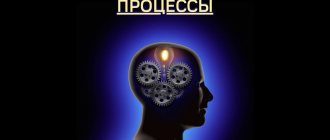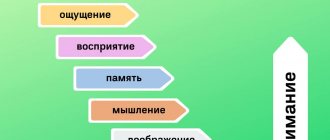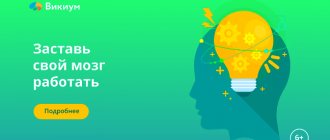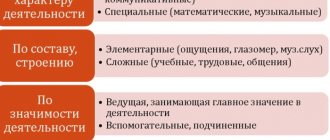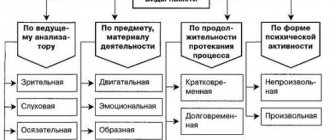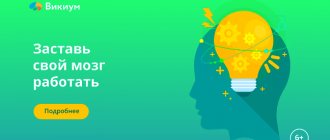Author: Eremchuk Lyudmila Gennadievna, neurologist. Researcher, Candidate of Medical Sciences.
Vital cognitive functions determine the level of personality in the social environment, attitude towards oneself and the quality of interaction with the outside world. Any everyday action is associated with the sphere of cognition and analysis, the work of the brain.
Cognitive neuroscience explores these manifestations in all their diversity, identifying the dependencies of the physical structures of nervous activity and human abilities. The development and training of memory, speech, and attention can improve the quality of life.
Even unconscious cognitive functions, such as background analysis of the situation around oneself, are the constant work of many neurons in brain structures. Neurobiology, namely its branch of cognitive neuroscience, is concerned with improving the ways in which these important cells of the body interact.
What does cognitive mean?
The concept of “cognitive” is a characteristic indicating the relationship of an object to the cognitive sphere controlled by the brain. Cognitive functions include the most complex functions in the field of higher nervous activity: writing, speech, analysis of the surrounding world, perception of reality, memory.
In the process of life, a person acquires and constantly improves cognitive skills, his cognitive characteristics, which determine what in everyday speech we call the level of intelligence. The closest thing to the concept of cognitive is the meaning of the word “smart,” which also means “developed, quick-witted.”
Drink coffee
Large amounts of coffee are harmful to the body, but researchers have found that caffeine does more than just keep you alert. It can help you concentrate on complex tasks, increases the efficiency of mental activity, and improves reaction. Coffee will not make a person smarter; this drink only temporarily improves brain function.
Coffee
Cognitive functions and processes
The dynamic processes occurring in the brain, both consciously and in the background, are all cognitive functions. They allow a person to constantly receive new information, process it in accordance with his current goals and experience, and produce adequate solutions for each situation.
Thought processes occur in combination: for example, when writing a poem, a person simultaneously uses fantasy, inner speech, interprets emerging images, and remembers how to spell a particular word. However, when one of these activities is disrupted, the others can be maintained in a stable state.
Cognitive researchers have described many cases in which a patient's speech or memory impairment did not affect his or her writing, reasoning, or learning abilities.
Analyzing the information environment, adapting to the conditions of the surrounding world, and planning adequate goals is only possible if cognitive functions are developed and within the norms. Identification of violations allows further correction of individual processes and improvement of a person’s quality of life.
To screen for functional disorders of the mental-cognitive sphere, specially developed methods are used. One of the most common is the Montreal scale for assessing cognitive functions; it allows you to collect and interpret data on the main range of mental processes:
- conceptual thinking;
- counting, speech;
- attention and memory;
- executive activity;
- concentration;
- orientation in space.
The examination lasts only 10 minutes and provides enough material to assess the level of development, speed and adequacy of reaction and other indicators of cognitive processes.
Drink wine
Norwegian scientists have found that people who regularly drink wine perform better on cognitive tasks than those who give up alcohol. This connection is especially pronounced among women. Of course, wine can only help if its quantity is strictly limited. It is assumed that the features of this drink are based on the antioxidant properties of wine.
Coffee
Cognitive thinking
Starting from birth, a person trains cognitive abilities, learns to think and interact with the world. The activity of his brain improves through three main stages:
- visual-effective, in which the child studies objects visually and by touch and analyzes incoming data;
- visual-figurative - during this period, the assimilation of rules of behavior, basic logical principles, development of memory and speech occurs;
- abstract thinking - a person learns to operate with images and abstract structures.
Normally, all three stages pass before adulthood, but even at an older age you can develop cognitive thinking in any available way: learn to play chess, solve logical problems, develop calligraphic writing, read educational literature, solve crosswords.
A selection of educational board games and puzzles for adults and children
Cognitive psychotherapy
In the process of developing psychotherapy, a direction arose that explains mental disorders and disorders through thinking errors. Scientists who adhere to this theory believe that correcting stereotypes of perception, beliefs, and behavior patterns can help a person rethink difficult situations and remove internal negative factors.
Cognitive impairments and disorders
During the course of life, the cognitive functions of the human brain can not only develop, but also degrade, gradually or as a result of injuries and serious stress. Treatment is selected according to the severity, motivating reasons and age group, since some of these disorders are reversible.
When cognitive functions are impaired in adolescents and children, it is usually easier to restore the original level, since before reaching maturity, the damaged nerve connections are replaced more actively.
Cognitive ability test from Vikium
Even short-term training of a number of cognitive abilities gives clear results. This is confirmed by research from the University of California. To understand how to improve cognitive and related brain functions, you must first determine your current level.
The most convenient way to do this is to use the Vikium service, which has established itself as the most advanced platform in this area. In a game form, it is proposed to devote only 15 minutes a day to the development of cognitive abilities. You can find time even with a busy schedule.
The program is compiled individually, since first the level of thinking is assessed in test form. The interpretation of abilities is built in relation to personal goals. This easily identifies the user’s needs, because as part of testing, it is proposed to indicate what exactly one would like to improve.
The advantages of the Vikium platform are the chosen unique approach to each user, since everyone has their own initial framework of cognitive development. In addition, the service’s training model is based on serious scientific developments.
The entertaining form of classes allows you to maintain interest in such a useful goal. In addition to individual puzzles, users can enter into competitions with each other. The choice of training is varied, you can play and develop for free, but the functionality and number of games will be limited.
If your goal is to seriously move to a new level of quality thinking, you can purchase an annual or permanent subscription and complete a full course of individually selected training.
Most of those who have developed cognitive abilities using Vikium platform simulators leave positive reviews on popular network sites. The service is also highly rated in reviews on this topic.
Wikium is constantly developing and adding to its functionality.
Lumosity
Lumosity is one of the most popular daily workout programs for adults. Applications have been made for Android and iOS, which contain more than 25 games for brain training. Games adapt to the user's level, maintaining the level of difficulty when solving a wide variety of problems. The tasks are based on university brain research, mainly from Stanford University.
Development of cognitive abilities
The human brain, as a structure of interacting neurons, is very plastic and adapts to changes in external conditions and to the goals that its owner sets for himself.
If you set a goal, then regular training can lead to truly impressive results. You can act in standard ways, for example, learning long poems by heart or solving mathematical problems, or you can combine familiar methods with original ones.
Exercises to develop cognitive abilities
The development of the cognitive and analytical sphere of the brain is useful not only for improving the quality of life, but also as a means of avoiding diseases that manifest themselves in the area of higher nervous activity.
Simple exercises to “pump up” cognitive functions will not take much time, but will be a good remedy against Alzheimer’s disease. It is best to treat them as a form of recreation or entertainment. Then they will become part of everyday life, and the benefits will be obvious. Below are examples of simple exercises that help develop different types of brain activity:
- Use your left hand to write if you are right-handed, and vice versa. This will improve the nerve connections responsible for coordination.
- Write a list of words that express emotions (laughter, pain, sadness, euphoria, etc.) and come up with a detailed definition for each. This activity promotes analytical and abstract thinking.
- Choose a simple drawing and study its lines for a minute. Then turn the sheet over and repeat it in as much detail as possible. The exercise trains visual memory.
- Make a chain of words in which each next one begins on the last syllable of the previous one. This lesson is aimed at improving verbal memory and associative thinking.
Give yourself permission to rest
In certain situations, it is really necessary to concentrate completely on the task and not stop to rest. Researchers have found that people who allow themselves to take breaks while working have much better memory than those who work without rest. It’s enough just to break away from your studies and think about something else.
Rest
Books for the development of cognitive abilities
Interest in the development of cognitive skills can be satisfied with the help of literature on this topic. A wide selection of books allows you to find the source that is right for you.
- . A serious publication that substantiates the postulates of the relationship between the physical structures of the brain and the cognitive abilities of the individual. Scientific data and results of modern research in psychology and related sciences are presented, the latest methods for studying brain processes in the transition from behavioral to visual are considered.
A. Soboleva. A series of books for the development of the cognitive sphere in children in a playful and accessible form. Three manuals are aimed at improving basic functions: speech, memory, motor skills, attention, and include tasks for children and advice for parents.
Read other useful articles on the site:
- How to better develop a child: a review of children's developmental techniques, games, objects and exercises
- How to develop your brain: exercises
- Top 16 sites for developing intelligence
Brain Metrix
But this is a real game, but it was created “according to the precepts” of neuroscientists. The one who can well predict the exact place where the ball will go will be able to show a high result. When playing, try not to focus on where the ball is, but try to predict where it might end up.
On the site you will find other free games against the computer that will help your brain better operate working memory. In some cases, they will immediately tell you the number of points, after which you do not need to continue the game - you have already achieved perfection.

